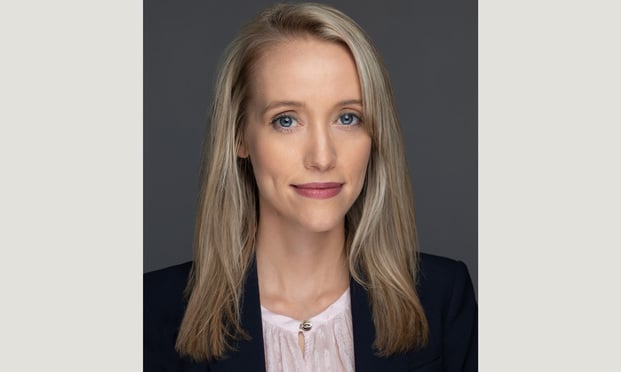Embracing Legal Technology Is Critical in the COVID-19 Era
It is arguably a transformative time for the profession. And legal technology can and should play a critical role in this transformation.
May 13, 2020 at 12:38 PM
6 minute read
 Jennifer G. Betts shareholder with Ogletree, Deakins, Nash, Smoak & Stewart.
Jennifer G. Betts shareholder with Ogletree, Deakins, Nash, Smoak & Stewart.
The disruptive impact of the coronavirus pandemic is reverberating throughout the United States economy. Due to the pandemic, the legal services industry, like nearly all sectors of the economy, is currently engulfed in a time of immense change. Enormous pressures to control cost, increase efficiencies, and continue to deliver quality legal services are mounting, while, at the same time, lawyers and alternative service providers are confronted with the difficult realities of (often) working remotely, managing home responsibilities, and remaining vigilant about physical and emotional health. It is arguably a transformative time for the profession. And legal technology can and should play a critical role in this transformation.
Changes to the Legal Ecosystem
There have been a number of technology-driven developments over the last few months for the legal profession. Among others:
- One of the most immediate changes caused by COVID-19 for attorneys is the unprecedented number of attorneys working remotely. Outside law firms have, almost overnight, mobilized a remote work force throughout the country (and globally as well) of attorneys and support staff. Collaboration tools, like web-based videoconferencing platforms, have become key elements of many attorneys' work processes. The integration of these tools is unlikely to go away, even as attorneys return to the physical workspace.
- For years, many have said that paper is dead. In the COVID era, with so many attorneys working remotely, the increasing irrelevance of paper is even more pronounced. For example, some registered agents are accepting service of process digitally rather than requiring delivery of originals. Moreover, for business contracts, tech developers have created a number of tools that allow for digitized contract requests, approvals, and executions, including through the use of e-signatures by parties. These tools are quicker, less expensive when scaled, and allow for instantaneous and arguably better recordkeeping than traditional paper-based models.
- Further, many courts have embraced technology in unprecedented ways. Judicial hearings via videoconference or teleconference are now commonplace, and judges are becoming increasingly comfortable with using technology to conduct court business and ensure that cases are moving forward. In the alternative dispute resolution arena, many mediators, arbitrators, and neutrals have wholeheartedly embraced technology and conducted mediations and hearings through videoconferencing tech.
- Moreover, the practical effect of the economic downturn has meant that legal consumers are interested in identifying ways to lower legal cost. As a means to deliver value and drive efficiencies, lawyers and law firms should strongly consider remaining nimble and open to tools already available (and rapidly developing) that automate certain legal services, such as responding to complaints and discovery as well as automation of document review and other services traditionally performed by attorneys. When scaled, these tools can drastically reduce the cost of services provided by outside counsel and drive significant cost savings to clients.
Embrace, but Be Mindful
The changes caused to the legal profession by the coronavirus pandemic are unlikely to be short term. Successful attorneys and firms will carefully evaluate available tech that enables them to remain efficient, productive, and collaborative (both internally and with clients). As more and more law firms embrace technology in unprecedented ways, it is important to remain mindful of compliance and practical risks that come along with these tools. This article will highlight two areas of suggested focus as organizations continue to incorporate new technologies.
First, the sudden embrace of new technology can lead to cybersecurity risks for law firms and employees working remotely. Organizations should embrace cybersecurity and data privacy best practices to avoid data breaches and any compromise of internal or client data. For example, law firms must ensure that data is encrypted and that access to encrypted data is tightly controlled. Contracts with tech vendors should be closely reviewed to confirm that they contain terms with sufficient data protection protocols. With respect to videoconferencing, simple steps can minimize the risk of intrusion (or conference bombing), like separately sending conference meeting identification numbers and passwords or turning on participant identification features. Further, virtual private network (VPN) use is advisable if possible; a VPN provides a direct connection to an organization's normal computer applications as if an employee was directly connected to the organization's computer network. Moreover, reminders to personnel of phishing risks and firm policies regarding malware are important and should be refreshed regularly during a remote work environment.
Second, the uncertainty and rapidity of change in the legal workplace and with workplace tools can create significant anxiety. Indeed, an entirely remote work environment has its drawbacks. The interrelationships between attorneys and the ability to collaborate with peers on cases and legal issues are traditional hallmarks of the legal profession—these strengths can be undermined in an entirely digital workplace. Further, a remote work world can lead to a feeling for attorneys, many of whom are already "always on", that there is no start or stop to the workday. Feelings of burn out and isolation can develop. COVID-19 presents a unique opportunity to emphasize (or potentially redefine) organizational culture and leadership priorities. When a global disrupter like COVID-19 turns traditional models of work on their head, organizations should consider creative ways to preserve company culture through meaningful, inclusive connections with their workforce. Tech collaboration tools and videoconferencing need not just be used to perform work tasks. They can also be harnessed in an intentional and proactive way to foster an ongoing sense of team unity. Some law firms have begun regular, all-firm digital wellness meetings like meditation sessions using the same collaboration tools that they use for work. Others, including my own office, schedule regular virtual coffee chats to check in with one another. In this way, technology can be used to foster a real sense of inclusion and community regardless of whether all team members are present in the same physical workplace.
Conclusion
The long-term impact of COVID-19 on the legal profession is impossible to predict with certainty. It seems inevitable, however, that the crisis will lead to more tech-based changes at law firms and internally within the legal department at corporations. Those attorneys that welcome these changes and understand the opportunities they present will have a leg-up in the post-COVID world.
Jenn Betts is a shareholder and co-chair of the technology practice group at Ogletree, Deakins, Nash, Smoak & Stewart, an international labor and employment law firm with offices in Pittsburgh and Philadelphia. She can be reached at [email protected].
This content has been archived. It is available through our partners, LexisNexis® and Bloomberg Law.
To view this content, please continue to their sites.
Not a Lexis Subscriber?
Subscribe Now
Not a Bloomberg Law Subscriber?
Subscribe Now
NOT FOR REPRINT
© 2025 ALM Global, LLC, All Rights Reserved. Request academic re-use from www.copyright.com. All other uses, submit a request to [email protected]. For more information visit Asset & Logo Licensing.
You Might Like
View All
Superior Court Directs Western Pa. Judge to Recuse From Case Over Business Ties to Defendant
3 minute read

Neighboring States Have Either Passed or Proposed Climate Superfund Laws—Is Pennsylvania Next?
7 minute readLaw Firms Mentioned
Trending Stories
Who Got The Work
J. Brugh Lower of Gibbons has entered an appearance for industrial equipment supplier Devco Corporation in a pending trademark infringement lawsuit. The suit, accusing the defendant of selling knock-off Graco products, was filed Dec. 18 in New Jersey District Court by Rivkin Radler on behalf of Graco Inc. and Graco Minnesota. The case, assigned to U.S. District Judge Zahid N. Quraishi, is 3:24-cv-11294, Graco Inc. et al v. Devco Corporation.
Who Got The Work
Rebecca Maller-Stein and Kent A. Yalowitz of Arnold & Porter Kaye Scholer have entered their appearances for Hanaco Venture Capital and its executives, Lior Prosor and David Frankel, in a pending securities lawsuit. The action, filed on Dec. 24 in New York Southern District Court by Zell, Aron & Co. on behalf of Goldeneye Advisors, accuses the defendants of negligently and fraudulently managing the plaintiff's $1 million investment. The case, assigned to U.S. District Judge Vernon S. Broderick, is 1:24-cv-09918, Goldeneye Advisors, LLC v. Hanaco Venture Capital, Ltd. et al.
Who Got The Work
Attorneys from A&O Shearman has stepped in as defense counsel for Toronto-Dominion Bank and other defendants in a pending securities class action. The suit, filed Dec. 11 in New York Southern District Court by Bleichmar Fonti & Auld, accuses the defendants of concealing the bank's 'pervasive' deficiencies in regards to its compliance with the Bank Secrecy Act and the quality of its anti-money laundering controls. The case, assigned to U.S. District Judge Arun Subramanian, is 1:24-cv-09445, Gonzalez v. The Toronto-Dominion Bank et al.
Who Got The Work
Crown Castle International, a Pennsylvania company providing shared communications infrastructure, has turned to Luke D. Wolf of Gordon Rees Scully Mansukhani to fend off a pending breach-of-contract lawsuit. The court action, filed Nov. 25 in Michigan Eastern District Court by Hooper Hathaway PC on behalf of The Town Residences LLC, accuses Crown Castle of failing to transfer approximately $30,000 in utility payments from T-Mobile in breach of a roof-top lease and assignment agreement. The case, assigned to U.S. District Judge Susan K. Declercq, is 2:24-cv-13131, The Town Residences LLC v. T-Mobile US, Inc. et al.
Who Got The Work
Wilfred P. Coronato and Daniel M. Schwartz of McCarter & English have stepped in as defense counsel to Electrolux Home Products Inc. in a pending product liability lawsuit. The court action, filed Nov. 26 in New York Eastern District Court by Poulos Lopiccolo PC and Nagel Rice LLP on behalf of David Stern, alleges that the defendant's refrigerators’ drawers and shelving repeatedly break and fall apart within months after purchase. The case, assigned to U.S. District Judge Joan M. Azrack, is 2:24-cv-08204, Stern v. Electrolux Home Products, Inc.
Featured Firms
Law Offices of Gary Martin Hays & Associates, P.C.
(470) 294-1674
Law Offices of Mark E. Salomone
(857) 444-6468
Smith & Hassler
(713) 739-1250






